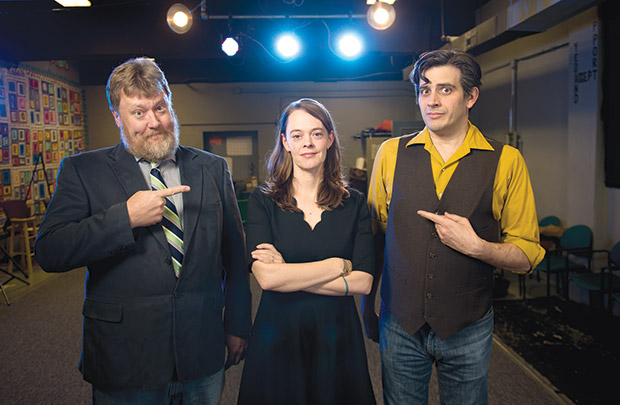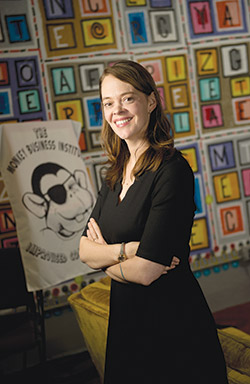Comedy workshops no laughing matter for attorneys
By: JESSICA STEPHEN//March 16, 2017//

Asking someone to imagine lawyers doing comedy improv might sound like the setup for a joke.
But, Christina Tenuta says, it’s no laughing matter.
“It’s enormously practical,” said Tenuta, a family law practioner at Schuster Law Offices in Madison.
It’s also something lawyers understandably participate in with a healthy dose of skepticism.
“I am not a person who is a performer at all,” Tenuta said. “I would never get up voluntarily and perform.”
But, she said, “They’re not teaching you to be funny or tell jokes; they’re teaching you to build on a narrative, which is not so different from building on the theory of a case. They’re teaching you to get an unexpected answer on the stand and take that in stride.”
Tenuta said the ability to do improv can have uses outside the courtroom.
“A lot of techniques improv performers use on stage, I find myself using it in my office sitting across my desk with clients,” Tenuta said. “Being able to listen to them in a way that is practical and helpful for me, so I get the relevant facts that I need but also helping the client feel listened to, which helps me and benefits the case.”

It’s not only lawyers who stand to benefit from having some improv experience, said Brad Knight, a facilitator for improv training. Engineers, doctors, bankers, government employees, teachers and even members of manufacturing groups can learn to respond in the moment to suggestions or cues they’ve received while improv-ing and then use role playing to build a story or scene.
“I often refer to it as a stimulus-response art form; you get information, then you process it and send it back out,” said Knight, owner and creative director of the Monkey Business Institute in Madison, which has trained more than 500 Wisconsin lawyers. Last fall, Monkey Business helped the Wisconsin State Bar offer its first continuing-legal-education course on improv.
Monkey Business grew out of Knight’s love of improv comedy, which he discovered through the now-defunct ComedySportz Madison. It has now been more than a dozen years since he decided to turn his interest into a business.
“We thought right off the bat that we’d include teaching,” Knight said.
So about 10 years ago, Knight and his business partner, Craig Johnson, who is also Tenuta’s husband, began offering both public classes and professional playshops — private sessions designed for small groups of colleagues or business associates, including attorneys.
And they’re not alone.
Improv classes are being held for lawyers throughout the country, in cities including Atlanta, Chicago and New York.
“A lot of people come to improv to improve their public speaking skills.” In fact, Knight said, “People are finding out that improv is completely ideal for what people often refer to as ‘soft skills.’”
In Wisconsin, it’s not only Tenuta’s work that has given lawyers an opportunity to try their hand at improv. Help has also come from students at the University of Wisconsin Law School.
“About the time I started learning more about improv from (my husband) Craig, I started having more court appearances and more trials,” Tenuta said. “And I found it was really applicable to courtroom presentation and juries and judges, but also basic communication skills.”
But they wanted to refine the idea, so they turned to the UW moot court team in 2015. After taking part in a mock court, students found themselves offering suggestions about how the experience might be tweaked. The critiques are now part of all professional playshop events, which end with debriefings meant to help students identify how they might use improv techniques in their work.
By 2016, Knight, Johnson and Tenuta began working with the State Bar. A successful launch was held at the Solo and Small Practice Conference last year, and now they’re looking for even more opportunities to offer courses.
Despite the bar’s stamp of approval, Knight acknowledged some attorneys remain resistant.
“We had one attorney at the conference who just didn’t want to do it,” Knight said.
It’s actually not unusual.
Knight has become so accustomed to skepticism, especially from engineers and attorneys, that he almost always spends a little time before each playshop helping participants prepare themselves for what they are about to experience.
“I tell them, ‘This is gonna seem hippy dippy and artsy fartsy, but if you give it a shot I’m pretty sure you’re going to get something useful out of it.’” he said. “And I think they’re able to go in without that logical bias, without having to plan everything.”
For Tenuta, it wasn’t until she saw improv in action that she was able to fully appreciate its benefits.
“There is a game that is offered in playshop called ‘Two Mouths, Two Ears’ that’s about two people telling you a story in each ear and listening to literally two people talking at the same time, which is a situation I find replicated in court all the time when a client is whispering in your ear responding to something the judge is say,” Tenuta said. “That really hones your focus and your listening skills.
“It’s just a great way for people to get out of their comfort zones in a really practical way,” Tenuta added. “It’s great for attorneys who are interested in performing, and it’s also great for people who considered themselves a bit more shy, even for attorneys who are not in the courtroom a lot. And it’s good for team building for firms to take this kind of class together. It’s great for improving attorney-client relationships, too, especially for the family law work I do because a lot of it is predicated on having a relationship of trust and that’s predicated on listening, so it’s not just about being flashy and funny. This is not supposed to be teaching comedic performance at all.”
Legal News
- FTC bans non-competes
- Gov. Evers seeks applicants for Dane County Circuit Court
- Milwaukee man charged in dismemberment death pleads not guilty
- Democratic-led states lead ban on the book ban
- UW Madison Professor: America’s child care crisis is holding back moms without college degrees
- History made in Trump New York trial opening statements
- Prosecutor won’t bring charges against Wisconsin lawmaker over fundraising scheme
- Republican Wisconsin Senate candidate says he doesn’t oppose elderly people voting
- Vice President Harris to reveal final rules mandating minimum standards for nursing home staffing
- Election workers fear threats to their safety as November nears
- Former law enforcement praise state’s response brief in Steven Avery case
- Eric Toney announces re-election bid for Fond du Lac County District Attorney
WLJ People
- Power 30 Personal Injury Attorneys – Russell Nicolet
- Power 30 Personal Injury Attorneys – Benjamin Nicolet
- Power 30 Personal Injury Attorneys – Dustin T. Woehl
- Power 30 Personal Injury Attorneys – Katherine Metzger
- Power 30 Personal Injury Attorneys – Joseph Ryan
- Power 30 Personal Injury Attorneys – James M. Ryan
- Power 30 Personal Injury Attorneys – Dana Wachs
- Power 30 Personal Injury Attorneys – Mark L. Thomsen
- Power 30 Personal Injury Attorneys – Matthew Lein
- Power 30 Personal Injury Attorneys – Jeffrey A. Pitman
- Power 30 Personal Injury Attorneys – William Pemberton
- Power 30 Personal Injury Attorneys – Howard S. Sicula











